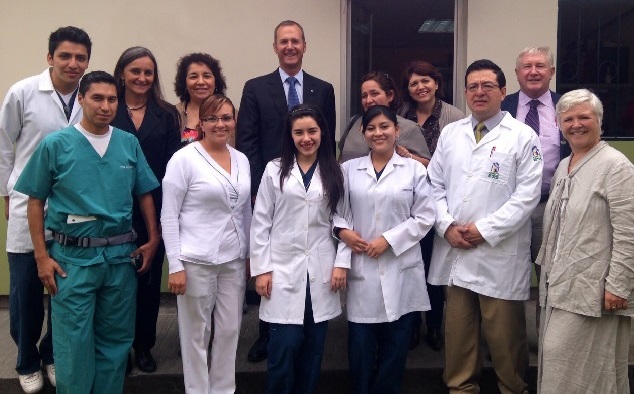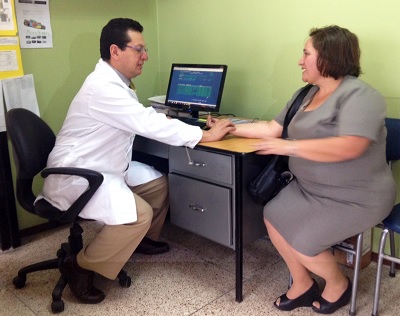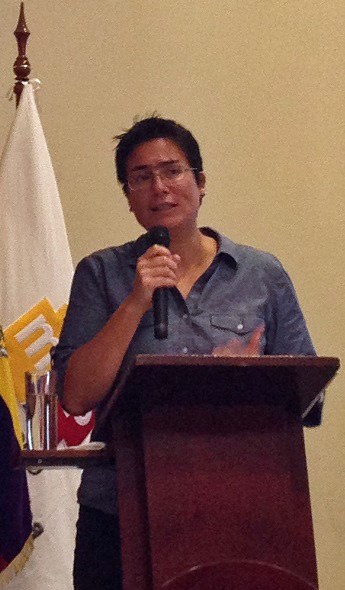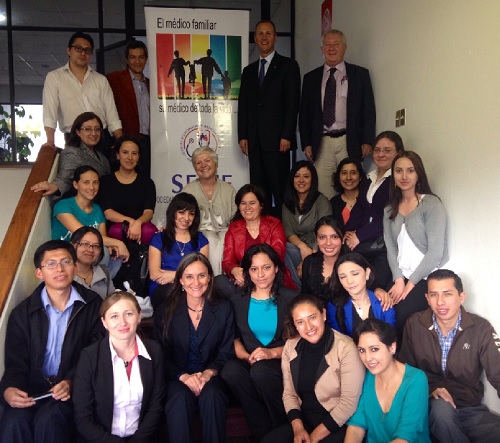From the President: the world of rural family medicine
 Photo: Members of the multidisciplinary family medicine clinic team at
the at La Ecuatoriana Family Medicine Clinic in Quito, Ecuador, with
WONCA President, President-elect & CEO
español
Photo: Members of the multidisciplinary family medicine clinic team at
the at La Ecuatoriana Family Medicine Clinic in Quito, Ecuador, with
WONCA President, President-elect & CEO
español
“Any patient with any problem, anytime and anywhere”
WONCA held our 12th International Conference on Rural Health in April in the rural town of Gramado in the mountains in the south of Brazil. This is the first time WONCA’s rural health conference has been held in South America. Over 600 rural family doctors from all regions of the world came together to discuss the challenges facing the delivery of health services to the people of the world living in rural areas.
Why is rural family medicine important? The answer is simple. Half the world’s population lives in rural areas. But half of the world’s doctors do not. As we all know, most of our colleagues in other specialties are based in cities or in large regional centres. It is the family doctors who are based in rural communities and who work with the members of their health care teams to provide medical care and advice to half the world’s population.
WONCA has a long tradition of supporting rural practice, through the activities and impressive achievements of our WONCA Working Party on Rural Practice.
Our WONCA Working Party on Rural Practice was established in 1992 at the WONCA World Conference held that year in Vancouver and right from the outset comprised rural family doctors from both developed and developing countries; rural family doctors who shared a vision of health for all rural people around the world.
I pay tribute to our WONCA Working Party on Rural Practice, which, for the past 22 years, has been such a strong and effective advocate for training and supporting sufficient numbers of skilled rural family doctors to meet the health care needs of the people living in rural areas in all nations of the world.
The WONCA Working Party on Rural Practice has been highly influential through close work with the World Health Organization (WHO) in the development of global health policies on rural health and in the roll out of programs to support rural practice.
The working party has developed a number of important policies
which have shaped global thinking on rural health care, including the 1997 WONCA Durban Declaration on the “Health for All Rural People”, the 1998 WONCA Policy on Rural Practice and Rural Health to assist governments around the world to better meet the health care needs of their rural populations, and the 2002 WONCA Melbourne Manifesto which is a code of practice for the international recruitment of health care professionals and which emphasises the responsibility of each country to ensure it is producing sufficient health care professionals to meet its own current and future needs, and that those countries that can afford to do so, train more health care professionals than they need and so help to redress the shortages in many parts of the world.
Our WONCA Working Party on Rural Practice has also developed policies on women in rural practice, on the health care of Indigenous People, on the use of information technology to improve rural health care, and on quality and effectiveness issues in rural health care; policies which cover the breadth of the key issues affecting the provision of rural medical care.
And in 2012 our rural working party, along with other global partner organisations and institutions at the last WONCA Rural Health Conference, released the Thunder Bay Communique, calling for new ways of thinking to ensure equity in the delivery of health services to the people of the world living in rural areas.
Our rural working party has organized a series of 14 successful WONCA Rural Health Conferences on all continents, including two conferences in Africa, in South Africa in 1997 and in Nigeria in 2006. The very first WONCA Rural Health Conference was held in Shanghai in 1996, at a time when China was first discovering the potential of family medicine to transform health care delivery to the vast population of that country, half living in rural areas.
Over the past few weeks I have had the opportunity to read the new WONCA Rural Medical Education Guidebook, written by members of the WONCA Working Party on Rural Practice. The book is available free of charge on our WONCA website and I commend it to you.
The book is a wonderful contribution to the medical literature and captures the essence of rural medical practice around the world and the key principles that underpin the work we do as family doctors and medical educators and primary care researchers based in rural areas in each of our countries. The editorial team of Bruce Chater, Jim Rourke, Ian Couper and Roger Strasser has done a marvellous job bringing together so many viewpoints from our colleagues from around the world.
In the opening chapter of the new WONCA Rural Medical Education Guidebook, Steve Reid from South Africa and his coauthors state, “The unique characteristic of rural medicine is the very wide scope of practice that is demanded of rural doctors” and how “over and above the wide minimum scope of skills, rural practice in different places demands different skills sets for specific needs” and how “beyond the skills set, there is a choice of a long term commitment to a rural community, that develops into a sense of identity, which is linked to a working lifestyle, a network of relationships continued over time, and a particular landscape.”
 Steve also reminds us how “Working in a rural community where resources and technology are not immediately accessible requires practitioners to make the most of whatever is available, often under challenging circumstances. The unique preserve of the rural practitioners is the flexibility demanded by the principle of ‘any patient with any problem, anytime and anywhere’. Dealing with uncertainty and balancing relative risks is a central part of the job.”
Steve also reminds us how “Working in a rural community where resources and technology are not immediately accessible requires practitioners to make the most of whatever is available, often under challenging circumstances. The unique preserve of the rural practitioners is the flexibility demanded by the principle of ‘any patient with any problem, anytime and anywhere’. Dealing with uncertainty and balancing relative risks is a central part of the job.”
Photo (right): Dr Adbel Robayo with Dra Erica Tinoco at La Ecuatoriana Family Medicine Clinic in Quito, Ecuador
It was timely that this conference was held in Brazil. Brazil is one of the countries leading the world in strengthening family medicine to ensure that health care is available to all people. Brazil has become a global leader in addressing universal health coverage through family health teams of doctors, nurses and community health workers. These family medicine-led primary care reforms are ensuring health care for all people in this large, complex and populous nation.
Following the WONCA Rural Conference, I travelled to Quito in Ecuador to participate in the 5th Iberoamericana Summit (or Cumbre) on Family Medicine, convened by the Ministry of Health of Ecuador and Municipality of Quito, in partnership with the Pan American Health Organization (PAHO) and WONCA’s Iberoamericana Region, CIMF (the Iberoamericana Confederation of Family Medicine).

Photo (left) : Night lights in the old city of Quito, a UNESCO World Cultural Heritage Site
I always knew the Summit was going to be exciting with representation from 20 WONCA member organisations and their governments from across the Iberoamericana region. Delegates shared details of the family medicine-based health reforms and developments underway in many countries across the region. The health system in Ecuador in particular is undergoing some impressive reforms based on strengthening access to family medicine for all people in that country.
 The summit ended with the presentation of “The Quito Declaration” (Carta de Quito), a strong statement expressing commitment to the ongoing development of family medicine across the region. It is notable that the letter was signed by the Ecuador Minister of Public Health, Carina Vance, as well as by PAHO and WONCA.
The summit ended with the presentation of “The Quito Declaration” (Carta de Quito), a strong statement expressing commitment to the ongoing development of family medicine across the region. It is notable that the letter was signed by the Ecuador Minister of Public Health, Carina Vance, as well as by PAHO and WONCA.
Photo: Minister for Public Health of the Republic of Ecuador, Carina
Vance, speaking at the 5th Iberoamericana Summit on Family Medicine in
Quito
I congratulate our WONCA Iberoamericana Regional President, Inez Padula, and our colleagues from across the region for the success of the summit and for their enduring commitment to the role of family medicine in strengthening the health systems in each of their countries.
Michael Kidd
President
World Organization of Family Doctors (WONCA)
Michael’s keynote address to the WONCA International Conference on Rural Health is available online.
Photo (below) Family Medicine trainees in Ecuador, with WONCA President, President-elect & CEO
